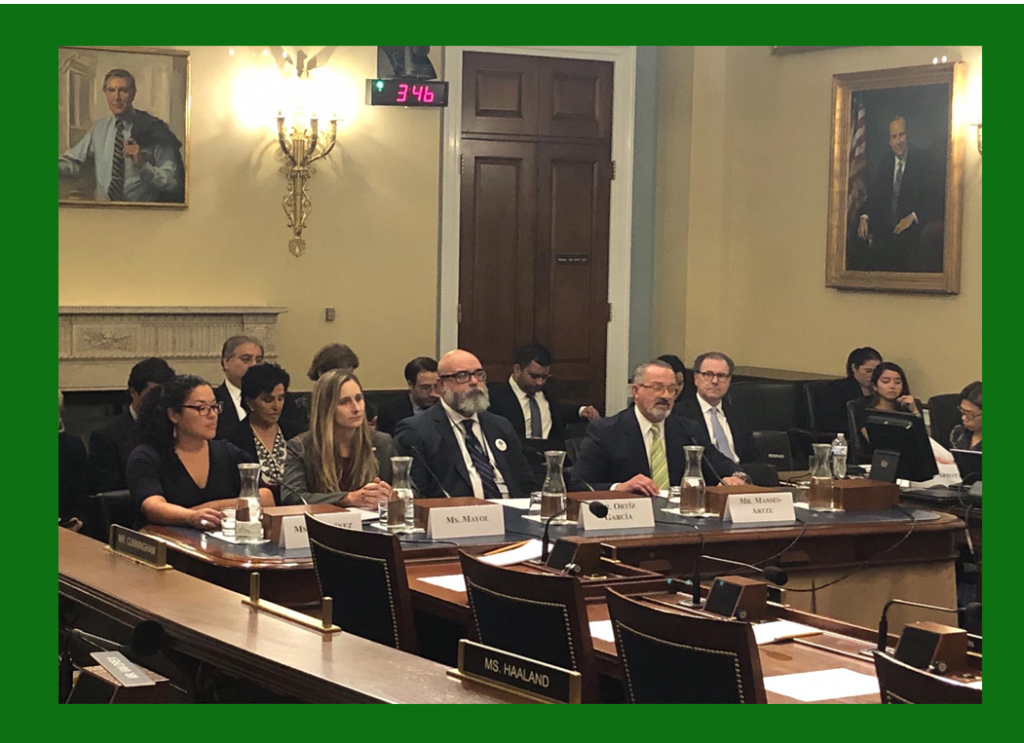
Profesor del Departamento de Ciencias Sociales y miembro del Comité Timón del Instituto Nacional de Energía
y Sostenibilidad Isleña de la UPR, fue invitado a deponer en las vistas congresionales del Comité de Recursos Naturales de la
Cámara de Representantes de los Estados Unidos sobre PROMESA. La vista se llevó a cabo el pasado miércoles 30 de octubre del 2019 en Washington DC.
Testimony before the Subcommittee of Natural Resources, US House of Representatives
Honorable Raul Grijalva Presiding
Good morning Honorable Chairman and members of the Committee. My name is Cecilio Ortiz Garcia and I appear in front of you today as Senior RISE Fellow at the National Council for Science and the Environment in Washington DC. I hold a PhD in Public Policy and Administration from The Arizona State University and for the last 15 years I have been involved in numerous research projects, programs and policy making activities related to the sustainable transition of Puerto Rico’s electrical system.
My remarks today will circumscribe to the following points:
- We recommend the figure of the Reconstruction Coordinator for PREPA – Recent studies on recovery and reconstruction processes suggest that having such a figure might help decrease the length of the recovery and reconstruction process and also increase the quality of the outcomes that could emerge from a better governance and decision-making model. It is important to frame the RC in the context of deconcentration of power and the descentralization of energy decision-making. This is crucial to its success in PR.
- The RC needs to be mindful about the extreme operating environment that he/she is dropping into – because of the extreme complexity of Puerto Rico’s post Maria recovery and reconstruction process, extreme care should be given to determine: a) how the interaction between the RC and PREPA’s internal and external communities will be framed?, and most importantly what role will the RC play in the overall planning of PR’s electric system from here on after.
- The RC must be perceived as an agent of Puerto Rican society and not as an agent of Congrees. PREPA or the state governmental institutions in PR. – While this amendment only visualizes an RC to supervise, control and oversee PREPA operations (and we agree that these are important objectives) the people of PR need to have confidence in the RC’s abilities to open PREPA’s governance blackbox. Integrating the RC figure in a framework of conflict will only exacerbate the climate of acrimonious fighting and could in fact lengthen the recovery and reconstruction process of the island electric system. In fact, the RC should help the people of Puerto Rico to reach its vision for a sustainable resilient, prosperous, just, equitable, democratic, sustainable electrical system, as expressed in the Energy Stateholder Forum. That vision revolves around an electrical system that maximizes the use of free, renewable and local energy sources; that is innovative and adaptive to social, climatic, consumption needs and economic changes; and that its decision-making processes are transparent, participatory, inclusive, integrative, ample and effective regarding all societal sectors.
- Ultimately, the RC needs a tool to help him or her achieve these boundary spanning objectives. That is a Technical Advisory Committee composed by local expertise and local scientific and nonscientific knowledge with connections nationwide to fill in the gaps and legitimize his/her work. The National Institute for Energy and Island Sustainability is, as the DOE stated in their reconstruction report, the best resource equipped to help the RC achieve this. The Technical Advisory Committee (TAC) is absolutely necessary as a boundary spanning tool to assist the RC in 1) effectively engaging with different sectors with Puerto Rican society; 2) capturing and internalizing the values, perceptions and attitudes not only of PREPA’s costumers but all electricity users in PR; and 3) effectively co-producing the knowledge necessary to transform not only the agency but the electric system in general.
Puerto Rico is right now the quintessential “canary in the mine”, not only because of its island condition and geographical location in the path of possible more frequent and stronger extreme weather events, but also because its current colonial condition. This makes Puerto Rico perhaps the greatest experiment in democracy. Thank you and I remain available to your questions.






